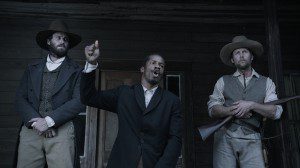
The Birth of a Nation won the top two honors at the Sundance Film Festival Saturday evening: the U.S. Grand Jury award—previously pocketed by such critical darlings as Beasts of the Southern Wild, Winter’s Bone and Whiplash—and the Audience Award. Chances are good we’ll be hearing much more about this film when the Oscars roll around next year.
While I haven’t seen the movie yet, it’s reportedly steeped in Christian themes.
Named after D.W. Griffith’s seminal and horrifically racist 1915 film (the Ku Klux Klan reportedly used it as a recruiting tool), Sundance’s Birth of a Nation depicts the 1831 slave rebellion led by Nat Turner, a man who convinced that God wants him to lead his fellow slaves to freedom.
Turner was born into slavery in 1800 but learned how to read and write. He read the Bible voraciously, could quote it as well as any preacher and was often seen praying and fasting. According to Kimberly Winston from the Religion News Service, “During his trial, he wrote he ‘heard a loud noise in the heavens, and the Spirit instantly appeared to me and said the Serpent was loosened, and Christ had laid down the yoke he had borne for the sins of men, and that I should take it on and fight against the Serpent, for the time was fast approaching when the first should be last and the last should be first.’”
But just as Turner and the era’s abolitionists used their faith to argue that slavery was a moral abomination, many southerners used Christianity as a buttress for the institution. Director Nate Parker—a Christian himself—doesn’t deny that messy reality in The Birth of a Nation.
“Scripture is quoted repeatedly throughout the film in many contexts;” Christianity Today’s Alissa Wilkinson writes. “I’m not sure I’ve ever seen a film with more of the Bible in the screenplay, including ‘Christian’ films.”
It’s an interesting statement, and it speaks to the deep complexity of both faith and Christianity itself—how it can be twisted in terrible ways, and yet remains such a tremendous catalyst for good.
Parker counts Turner as one of his heroes. Like Turner, Parker prays a great deal. And like Turner, Parker sees himself as something of an activist. “This is my tool, this is my weapon,” he told Southern California’s The Frame. “Nat Turner used an axe. My axe is a camera, and sound equipment, and an incredible crew.”
When asked by The Frame what modern audiences can learn from Nat Turner, Parker said:
I think it’s quite simple. One, that true healing requires honest confrontation—confronting injustice where it stands. That’s what Nat Turner did. And he did it through a standpoint of love and faith. How do we pull that into 2016? Well, this is what I think: if there’s a system that exists and there are injustices throughout that system, we have to know that they will corrupt us completely. We will be further corrupted and corroded, right? The moral fabric of who we are will be corroded to nothing.
Conservative Christians sometimes talk about Hollywood as a den of immorality. But moviemaking, be it secular or Christian, is an inescapably moral business. Granted, its morality may not always line up with ours; sometimes it can be diametrically opposed. But most movies are not simply telling stories for the story’s sake: They’re making a point. Look at many of Oscar’s best picture nominees this year—The Big Short, Spotlight, Bridge of Spies, etc.—and we’ll find that they’re telling us that this is wrong or this is virtuous. It’s up to we moviegoers to accept or reject the film’s sense of morality—and to use it as a springboard to think about our own.
Clearly, Parker takes his role as a moral storyteller seriously, and that’s gratifying to see. I’m looking forward to seeing The Birth of a Nation, to see where its springboard takes me.












